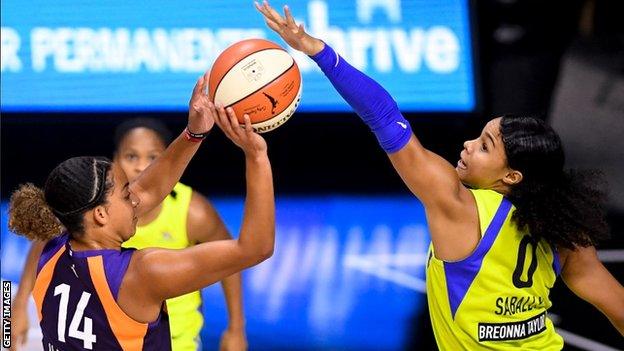Satou Sabally: Dallas Wings player on internal conflict and 'using her platform'
- Published
I'll always speak up for things I think are wrong - Sabally
This piece contains discriminatory language.
"It's funny that when I am in Germany I am the black girl, then when I go to Gambia I'm the white girl."
Satou Sabally was born in New York to a German mother and Gambian father. Growing up, family holidays were a source of confusion.
"Wherever I am, I don't feel like I am 100% anything," she tells BBC Sport. "As a mixed-race child it was really like you're living a double life - there's so much internal conflict about who you really are."
Tipped as one of the future stars of the WNBA, Sabally was selected as the second overall pick by the Dallas Wings in this year's draft.
A 6ft 3in small forward, the 22-year-old is averaging 11 points and seven rebounds per game - living up to pre-season expectations even though she is not totally satisfied.
"I think I am doing OK," she says. "The three-point shots are not falling as they should but I still have good numbers so that's promising."

Satou Sabally (right) is averaging 11 points and seven rebounds per game in the WNBA
Sabally is establishing herself as a fighter off the court, too.
She has become a prominent voice in the global social call for change sparked by the death of George Floyd in Minneapolis in May 2020.
"It's taken me a while but now I have realised I can be lots of different things," she says.
"No-one should have to change for anybody or live up to what they expect, you just have to be true to who you really are."
Sabally recalls two incidents from her childhood which deeply impacted on her.
In one, on a trip to a German zoo during her teenage years, she was asked if she had "escaped from the monkey cage".
On another occasion her dad was asked to provide ID by police who only left their house after her mum returned and confirmed he lived there.
"My brother is constantly followed around grocery stores because he's a tall black guy," she says.
"Just a week ago my friend posted on Instagram about being chased in Berlin by five white guys. He's one of the sweetest guys. He shouldn't have to fear for his life just because he's black."
Sabally acknowledges that as an athlete she has "certain privileges" and wants to "use my platform for good".
"It's important for me to speak out because firstly I am a thinker," she says.
"I still can't decide whether that's a gift or not. I have certain values my parents taught me and they've always said to speak up for what I think is wrong.
"My mum always said as long as it's safe to do so, you should - and I know I live in a country where I can use my platform for good and I do so because there are people living elsewhere that can't."
Sabally says playing basketball has opened up her world.
Having travelled to so many different places, and interacted with so many different people, she feels she has no choice but to try to create a world where everyone is treated equally.
"There are people that tell me to stick to sport but those are the people who don't want to see the world that way so I just blank them out," she says.
"To me, things feel different this time round and I think the support of white people has been the biggest change.
"Four years ago the WNBA were having a debate about whether players would be fined for wearing messages on their shirts about how they felt.
"This year the league has been proactive in us wearing the names of black people who've died or messages that we want to share.
"It feels like a movement and a moment. I feel like this is the tipping point."